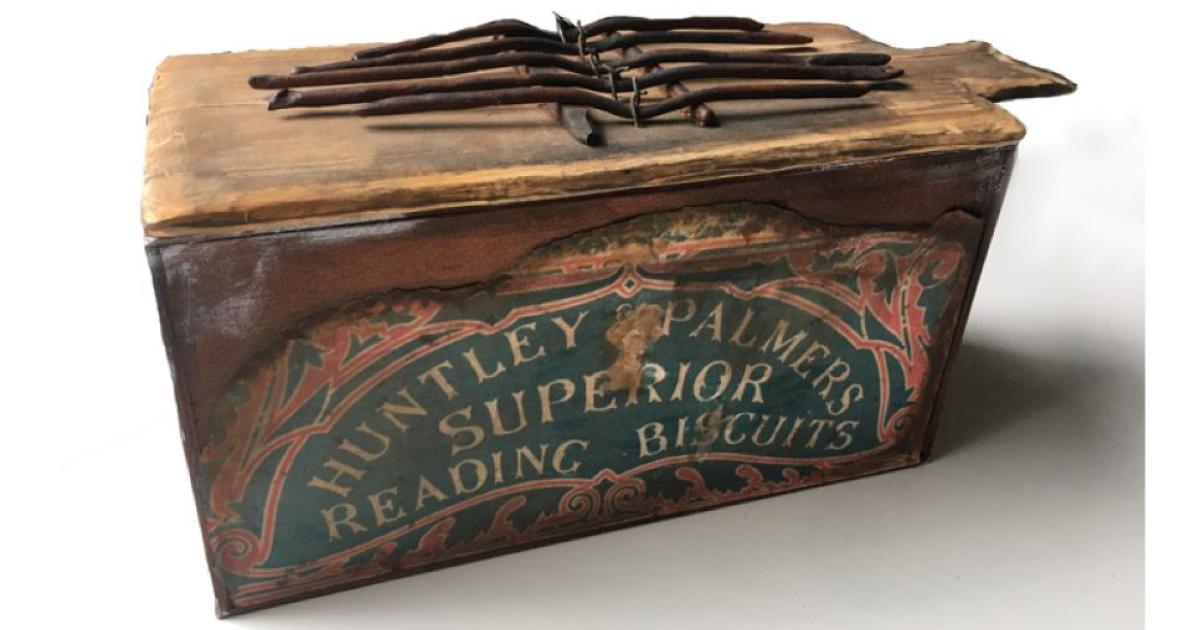IFTR Performance in Public Spaces Working Group
Dr Lucy Tyler & Dr Lisa Woynarski
University of Reading
2022
A Biscuit Tin Unravelled: Commissioning Commodity Trailing in Performance for Decolonization
How can performances in public space, performance commissioning models and partnerships between public Arts institutions adopt the practises of ‘Commodity Trailing’ for the purposes of decolonization? Commodity trails are an amalgamation of the ethnographic methods ‘Commodity Chain Analysis’ and ‘Trails’ from the fields of geography and anthropology that respectively ‘follow a particular commodity through different stages of production’ and ‘animate the topographies they cross’ (Kleine 2010; Knowles 2014). In this paper, we explore how a performance commissioned from our Arts Council England-funded project, Work in Progress, seemingly deploys ‘Commodity Trailing’ as a method that supports processes of decolonization in a number of contexts: our institutions, public spaces and selves. In this paper, we focus on one of these performances: Fast Familiar’s The Acquisitions Panel (2022) which was developed in partnership with the Museum of English Rural Life (MERL).
We enter a conference-like room with tables arranged into a circle. On each table is a glass of water, a note pad, iPad, pen and a name plate with numbered panel members. We are offered Huntley & Palmers biscuits. As we settle into our seats around the table, an object is placed on a plinth in the centre. It is a late nineteenth century Huntley & Palmers’ biscuit tin which has been turned into a musical instrument with steel keys: a sansa or likembe (an object that in reality sits in the MERL collection). Through interviews, documents and videos presented on our iPads, we are asked, as a citizen panel, to decide on whether the Berkshire Municipal Museum (fictional) should acquire this instrument. Questions of provenance and duress in the original acquisition of the object by a British officer in the Congo are considered, as well as the way in which the Huntley & Palmers’ biscuit tin is a symbol of the British Empire. Huntley & Palmers was at one time the world’s largest biscuit manufacturer, founded in Reading, England in 1822. Their biscuits, in distinctive decorated tins, would be sent to the British ‘colonies’ to provide a ‘taste of home’. This one was acquired in the Congo at a time when it was colonised by Belgium. During this period, there was a high demand for rubber to make tyres in Europe. Belgium granted rubber collecting rights to companies who then used the forced labour of the Congolese people to collect it. We hear in the performance that the colonialists punished those not meeting the rubber quota by death and torture, resulting in the death of 10-13 million Congolese people. Through interviews with museum curators and members of the Congolese diaspora, the work asks the audience to consider whose voices and experiences are centred in the stories we tell about objects and our own histories.
In this paper, we suggest that the dramaturgical form of The Acquisitions Panel can be read as an advancement on the geographical practice of commodity trailing. The piece decentred whiteness by prompting challenging questions about decolonization.
Lucy (she/her) and Lisa (she/her) commission new performance making in the UK via the Arts Council England-funded Work in Progress Project, in conjunction with South Street Arts Centre and the Department of Film, Theatre and Television at the University of Reading, England – where they also work. They have a shared investment in anti-racist, feminist and de-colonised approaches to commissioning and writing about performance and other cultural forms. Lucy specialises in new play development and anti-capitalist politics. Lisa specialises in intersectional ecological practices in contemporary performance.

